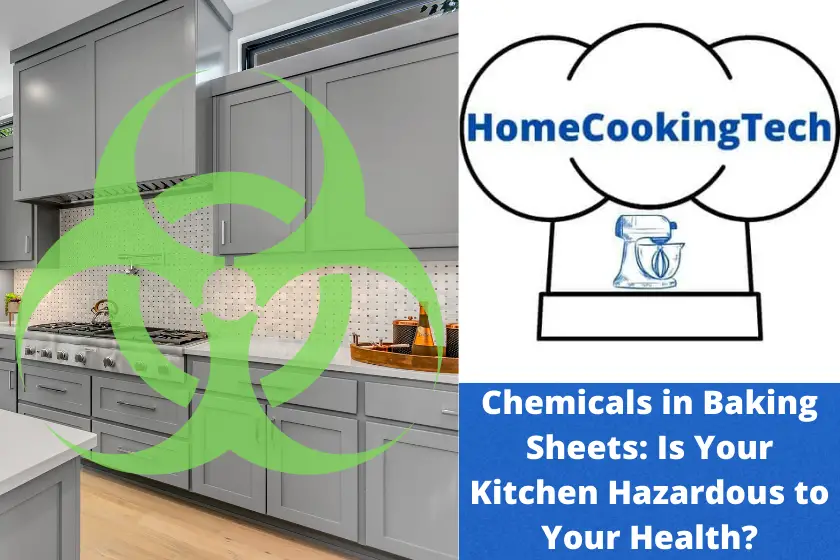We all know that we should be using non-stick pans like cast iron to cook with, but are our baking sheets just as important?
Chemicals in the coating of aluminum and other types of baking sheets can leech into your food when you bake. Research has shown that exposure to these chemicals can cause adverse health effects. Interested in what are the risks and how to avoid them? Keep reading!
If you want to protect yourself and your family, it’s best to replace your old baking sheets with new, safer ones for you and delicious for your family. Here are some tips on how to do this and why you should!
What are the health risks of baking sheets?
The chemicals in aluminum sheets can leech into food when it is heated. This has been shown to cause adverse health effects, such as infertility and certain cancers.
The coating on some baking sheets contains perfluorooctanoic acid (PFOA) and perfluorooctanesulfonic acid (PFOS), which are toxic. These chemicals are used in manufacturing the non-stick coating. When these chemicals get onto your food, they are transferred to your body with each bite you take, where they can remain for a long time.
Exposure to PFOS has been linked to several diseases, including thyroid disease, diabetes, and high cholesterol. PFOA exposure has also been linked to fertility issues and low birth weight. It is one of the critical components in Teflon that is no longer being manufactured after safety concerns were raised.
In addition to health risks, the coating on some baking sheets can flake off into your food when heated. The chemical coating on these baking sheets is typically made from PTFE or nylon that can sometimes melt or release fumes when heated up past 350 degrees Fahrenheit (176 degrees Celsius).
How to choose new baking sheets
There are many different types of baking sheets, so it can be a challenge to know which one is the best for you. But there are a few things you should keep in mind when choosing new baking sheets.
First, make sure they’re oven-safe.
Aluminum baking sheets aren’t always oven-safe. If you want to use them on your stovetop or bake them in the oven without risking damaging them, make sure that the material is oven-safe.
Second, make sure they won’t warp.
You don’t want to invest in a baking sheet that you have to keep warping back into shape with your oven’s heat and then cooling it down again for the next round of cookies or muffins. A little extra investment is worth avoiding potential frustration later on when food gets spilled out onto an uneven surface because the pan warped while cooking.
You should also get a baking sheet with raised edges to contain any spillage. The non-stick surface will help remove the cake without breaking it. At the same time, the silicone or metal ring around the edge makes removal easier when you are ready to serve your masterpiece.
Non-toxic baking sheets
There are many non-toxic baking sheets on the market. If you are looking for a safe and non-toxic baking sheet, there are some great options to choose from.
If you are interested in a deeper analysis of different cooking materials, click here and enjoy my extended article about them.
For example, silicone baking sheets are a good option. There is also the benefit of them being non-toxic and heat resistant. They’re perfect for cooking or baking because they don’t scratch easily as steel products do. And you can use metal utensils on them without worrying about scratching them up (unlike ceramic). This makes clean-up easier in addition to its other benefits!
Glass baking sheets are a healthier alternative to their metal counterparts. They’re also more durable and will last you much longer than the average cookie sheet. Additionally, they can be used in both conventional and convection ovens with no risk of doing any damage to them!
Stainless steel baking sheets can also be a good option, as they are non-toxic and durable.
They are easy to clean, even with heavy-duty scrubbing. Suppose they do get banged or scratched up in the dishwasher. In that case, you can easily polish them back to their original shine without any hassle.
Stainless steel baking sheets are also a good option for those who prefer not to use aluminum pans because of potential health concerns. Things like absorbing these harmful chemicals into food and causing an allergic reaction: stainless steel does not have this problem!
How to care for your new baking sheets
Caring for your new baking sheets is easy. Just make sure you don’t use metal utensils on them, as they can scratch the surface and cause damage. Also, avoid using abrasive cleaners like steel wool or scouring pads to clean your baking sheets.
These can also scratch the surface and cause damage. Instead, use a soft sponge or cloth with warm water and mild soap to clean your baking sheets.
To take care of your new baking sheets, follow these three steps:
- Clean them regularly
- Store them away from heat and moisture
- Don’t overheat them (leaving food on the pan too long or cooking at extreme temperatures).
If you are interested in how to clean your baking sheets, check out my in-depth article here.
Conclusion
If you often bake and use baking sheets, it’s essential to be aware of the risks of using a toxic product in your kitchen. These are some things you need to know to choose and use your new baking sheets safely.
























